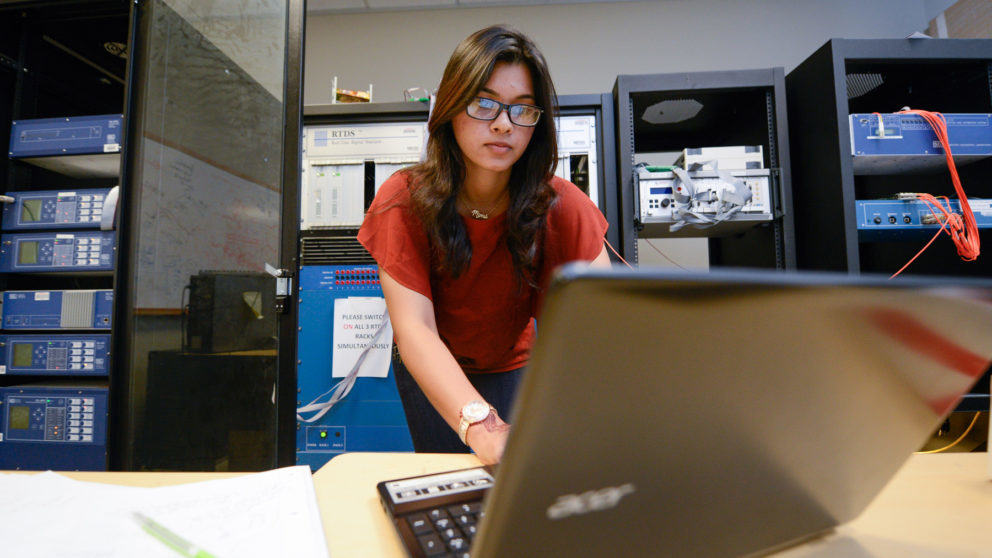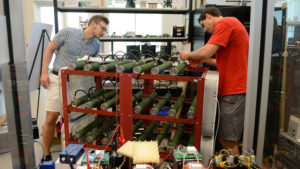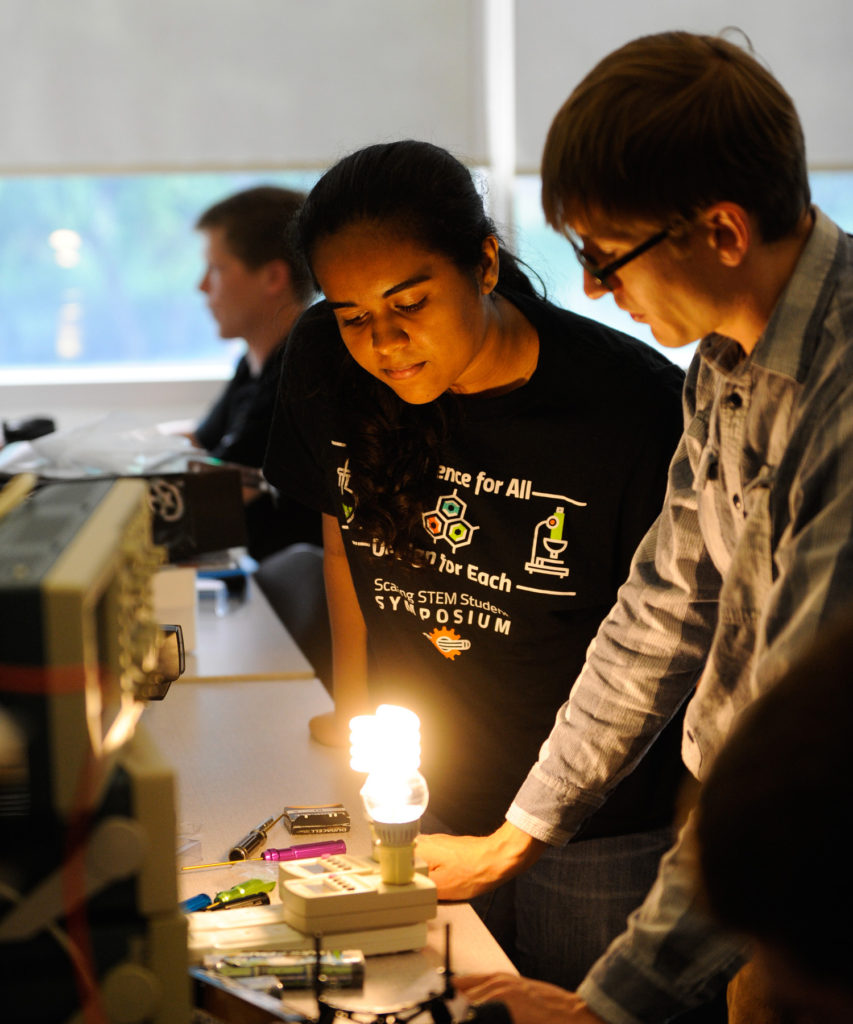
Afsana Chowdhury works on a computer tutorial in FREEDM’s Research Experience for Undergraduates summer program. Photo by Marc Hall.
Inside the Green Energy Hub at the FREEDM Systems Center in Raleigh, North Carolina, researchers ran into a problem while testing a prototype of an innovative battery charger that could charge electric vehicles more quickly. A resistor load bank that converted the charger’s electrical energy to heat during testing was overheating due to uneven airflow across the resistors.

They turned the problem over to two undergraduates.
By summer’s end, electrical engineering students Tim Sonnenberg and Alex Nowinski will be ready to test an idea suggested by faculty mentor Srdjan Srdic: a power converter they designed and assembled to control fans attached to the resistor bank. Continuous adjustments to the speed of the fans should even out the airflow over the resistors, Srdic told the students, reducing or eliminating hot spots.
“In class, circuits are just lines on a page,” Sonnenberg says. “Here, we see how these things actually work and what you can do with them. This is the real world.”
The students didn’t get this research opportunity by chance. They’re enrolled in FREEDM’s Research Experience for Undergraduates, or REU, a competitive 10-week summer program designed to give students an immersive laboratory experience. Thanks to funding from the National Science Foundation, the program is open to undergraduates nationwide who are majoring in electrical and computer engineering, civil engineering, mechanical engineering, materials science engineering, computer science or related fields. NC State students participate with funding from Duke Energy and the dean’s office in the College of Engineering.
Another student in the program, electrical and computer engineering major Afsana Chowdhury, is developing a computer tutorial for first-time users of the ExoGENI testbed, a virtual computing infrastructure that FREEDM uses to test smart-grid innovations.
“I had no experience with computer networking before this summer,” says Chowdhury, who moved to Raleigh from Bangladesh last fall to study at NC State. “I applied for the REU program because I wanted to see how researchers actually work. I didn’t think I could do a research project by myself.”
Happily, she learned otherwise. Although the first week was tough, Chowdhury says, her project is quickly taking shape, and now she’s eager to pursue hands-on research in other areas.
“I like computer networking, but I want to work in other fields so I can begin to figure out what I’d really like to do in my career,” she says. “I want to taste everything.”
It’s not only undergraduates who have research opportunities through FREEDM. In a lab in Engineering Building II on NC State’s ultramodern Centennial Campus, high school students are midway through the Young Scholars program, a four-week summer experience that includes field trips, speakers and hands-on research projects under the guidance of local public school teachers and graduate students from NC State’s College of Education.
Chitra Srinivasan, a 15-year-old rising sophomore at Wake STEM Early College High School in Raleigh, is putting the finishing touches on a smart meter designed to deliver real-time data on home energy consumption. Homeowners could use the device to reduce energy use during peak demand hours, when electrical rates are highest, she explains.
“I’ve learned a lot about the smart grid in this program,” she says. “Honestly, I never even knew what it was before I came here.”
Erik Schettig, a technology, engineering and design teacher at Middle Creek High School in Apex, North Carolina, is giving Srinivasan pointers on designing a lesson plan and poster. As lead instructor for FREEDM’s pre-college programs, Schettig is delighted to watch young researchers tackle projects using circuits, microprocessors, sensors and other advanced engineering tools.

“It’s a great opportunity for them to see what our current graduate students and engineers are working on, what new technologies are being developed by our industry partners and what innovations are on the horizon,” he says.
Shane Westhafer, who teaches technology, engineering and design at Panther Creek High School in Cary, North Carolina, is also working at FREEDM this summer as a participant in the center’s Research Experience for Teachers, or RET. Teachers in the four-week program share lab space with students in the Young Scholars program, often leading to intense collaborations between teachers and students.
Westhafer is absorbed in developing new lesson plans that leverage the power and simplicity of the Arduino, an open-source, single-board microcontroller that can be customized to create smart meters, battery chargers and thermostats, among other things. He appreciates the chance to learn new skills while also earning a stipend, a key benefit of participating in RET.
“It’s really hard to find time to learn new things in the classroom,” he says. “So this program is particularly rewarding. I never expected to have paid professional development, and it’s an eye-opening experience.”
All of FREEDM’s educational programs have a common goal: to get students and teachers excited about technology and engineering, especially as they relate to the smart grid and the future of distributed energy.
“These programs connect them to what’s being done in the real world,” says Pam Carpenter, FREEDM’s education director. And, she adds, there’s no place to conduct these programs quite like NC State’s Centennial Campus, home to a world-class research library, more than 50 industry partners and two NSF Engineering Research Centers: FREEDM and ASSIST, the Center for Advanced Self-Powered Systems of Integrated Sensors and Technologies.
“There are multiple opportunities for young researchers with our centers and institutes at NC State,” Carpenter explains. “These research experiences prepare students with the critical skills needed to succeed at school and in the workforce.”
Chowdhury, the student from Bangladesh, appreciates the value of these opportunities, and she’s excited to explore new ideas, confront new challenges and develop personal and career-ready skills.
“I had tears in my eyes during new student orientation,” she says. “I think this is the best place I could be. It feels like home.”
FREEDM’s pre-college programs are offered through participating schools in Arizona, Florida, Missouri and North Carolina.
